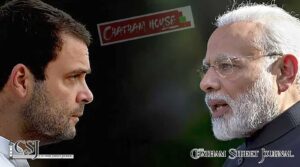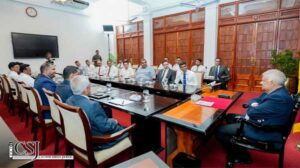Sri Lanka’s economic disruption attempts fade gradually

When the pendulum on Chatham Street has swung from local government election demand of power crazy red plus blue politicians to economic resilience, the government has staved off the impact of economic crisis on the people with fiscal and monetary stabilization measures.
The local government election is now nonexistent as it was announced by a defunct commissioner with no legal powers while far reaching tax reforms just begin to boost cash flow of the treasury to meet day today expenditure, offering a glimmer of light at the end of the tunnel.
President Ranil Wickremesinghe says that the Election Commission has not yet legally decided on a date to hold the election and that there are no funds to conduct an election. “The election has not been postponed and there is no election to be postponed”, he told Parliament on Thursday (23). The President highlighted that his priority is to rebuild the economy. “I prioritize the economy. If it is not built, there will be no country left.”
Some impression of fiscal stability has come not through revamping the economy, but through a series of painful tax increases, austerity measures including cuts on budgetary allocations for ministries and state institutions along with subsidy cuts that have further constrained demand. While necessary, the moves are unpopular and offer slogans to the political opposition, which raises the risk that this government pulls back on them. For now, though, analysts feel slightly better regarding the next 12 months — while stressing that they won’t be easy.
Despite President Wickremesinghe’s best efforts, the island’s ailing economy still remains on a ventilator, with the government yet to secure a way out of overwhelming debt but to some solace, approval of the Executive Board of the International Monetary Funds (IMF) to unlock its USD 2.9 billion bailout package is slated in March with assurances of bilateral creditors.
However, Sri Lankans have become resigned to a sad reality: pared-down meals, shrunken incomes and reduced expectations while President Wickremesinghe is resorting to every possible measure to find some relief for them under severe economic constraints.
Inflation measured by the national prices eased in January to 53.2 percent continuing the months-long streak of disinflation, but the price pressures still remain in the economy as prices rose from a month ago.
The World Food Programme (WFP) observed that nearly seven in ten households are adopting food based coping strategies such as relying on less preferred food, limiting portion sizes and reducing the number of meals.
In addition, WFP said that over eight in ten households are turning to livelihood coping strategies such as borrowing money or spending savings.
Sri Lanka’s stocks edged up at the close for the fifth consecutive session as the Colombo Stock Market regained momentum on Wednesday (22), fueled by positive macroeconomic sentiment and primarily driven by gains in the financial and energy sectors, according to brokers.
“Reports that the International Monetary Fund will proceed with the fund facility even without Chinese assurance are driving the market,” an analyst said. “With the fund facility, the market anticipates a rate cut that will push the market even further.”
Meanwhile, the All Share Price Index (ASPI) gained 0.15 percent, or 13.90 points, to reach 9,160.25, the highest since February 3.
Analysts said that reports by Energy Minister Kanchana Wijesekara that the QR code for fuel will be removed in the coming weeks drove Lanka IOC to become the top gainer for the day.
With the expected tax adjustments, the government is expecting a total income of Rs. 173 billion, but for essential recurrent expenditure alone, it requires Rs. 196 billion, resulting in a deficit of Rs. 23 billion for the month of March.
State sector salaries cost another Rs. 87.4 billion while pensions and income supplements (Samurdhi) were Rs. 29.5 billion. Other expenses were Rs. 10.8 billion while capital spending was Rs. 21 billion, totaling Rs. 148.7 billion.
The amount needed to service debts in March is Rs. 508 billion while Rs. 377.6 billion in debt service payments for January 2023 had to be done with borrowings from treasury bills, bonds and a Central Bank provisional advance of Rs. 100 billion.
The Treasury has explained its predicament as arising from a government decision to prioritise five areas for the utilization of government funds. The treasury secretary has pointed out that due to the ongoing economic crisis, the government has decided that funds should only be utilised for essential services.
Such services have been itemised and do not include expenses for the conduct of local elections. These are the purchase of paddy from farmers, provision of nutrition to malnourished children and pregnant mothers, gratuity payments and outstanding bills from the decentralized budget programme. If expenses were to be met from outside the list of items, special approval has to be obtained.
It is also necessary to amend existing laws and bring new laws to establish responsibility and accountability in the financial sector to prevent the recurrence of the economic bankruptcy that occurred. To this end, a new public finance management law is to be adopted immediately which binds the responsibility and accountability of the Ministry of Finance and its authorities for the stability of income, expenditure and debt, and the provision for Debt Management and Fiscal Management (Responsibility) Act (2003) should be updated.
A new Financial Regulation Act (Monetary Law Act 1950) which ensures accountability of inflation and financial supply is to be introduced in line with the old Act and thus the independence of the Central Bank should be assured. It has proposed that the Monetary Board and the Governor of the Central Bank and the top management should be made responsible and accountable for the financial situation.
A new independent agency will be set up for public debt management. The Central Bank and the Treasury can work together in its front office and back office functions and the debt management strategy should be managed by the middle office.
It has also been suggested that a new strong act should be introduced to prevent corruption and it should ensure professionalism for investigations, the confidentiality of the complainant, efficiency and impartiality of investigations and litigation.
Furthermore, the prices of all food items, essential services, medicine and health care should be brought to a digital platform and any service supplier and consumer should be given the facility to access it, allowing the consumer to receive the best service for the lowest cost while boosting market competition.
Carcharodon








